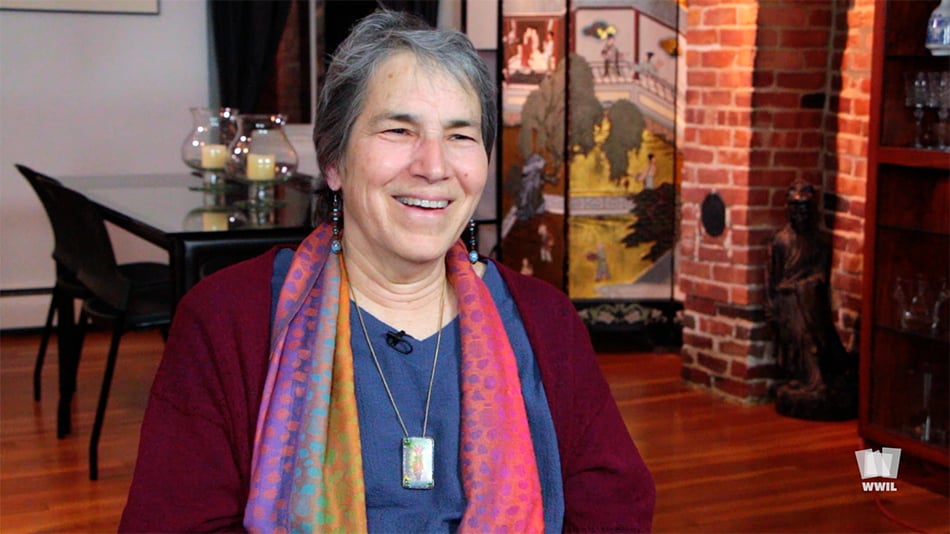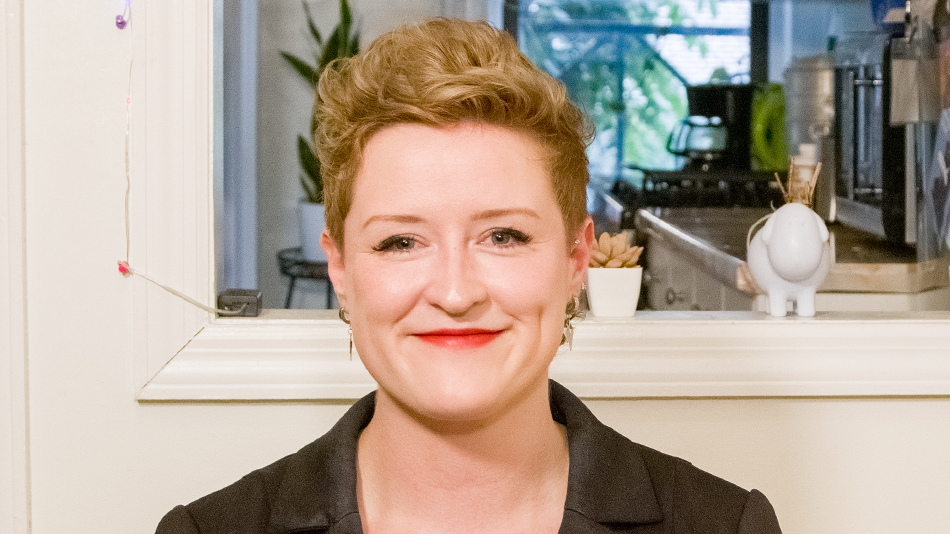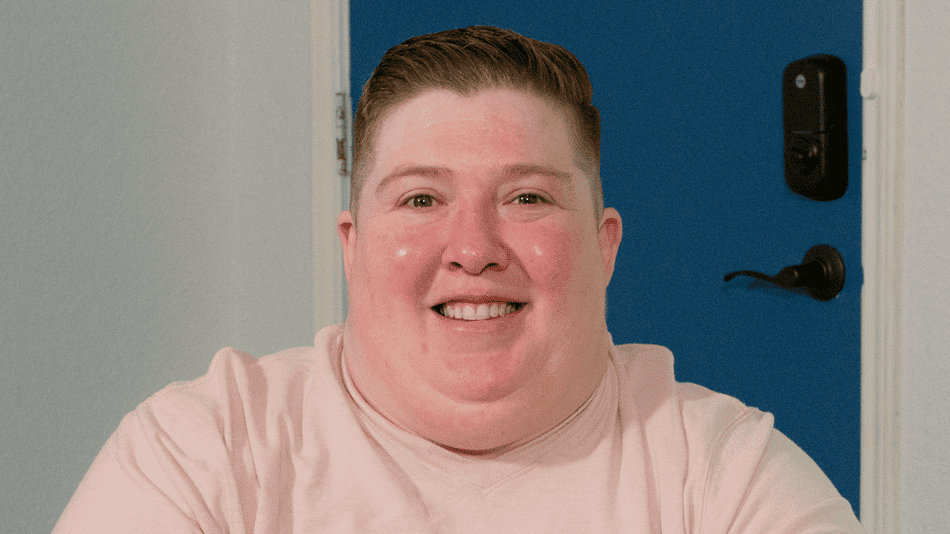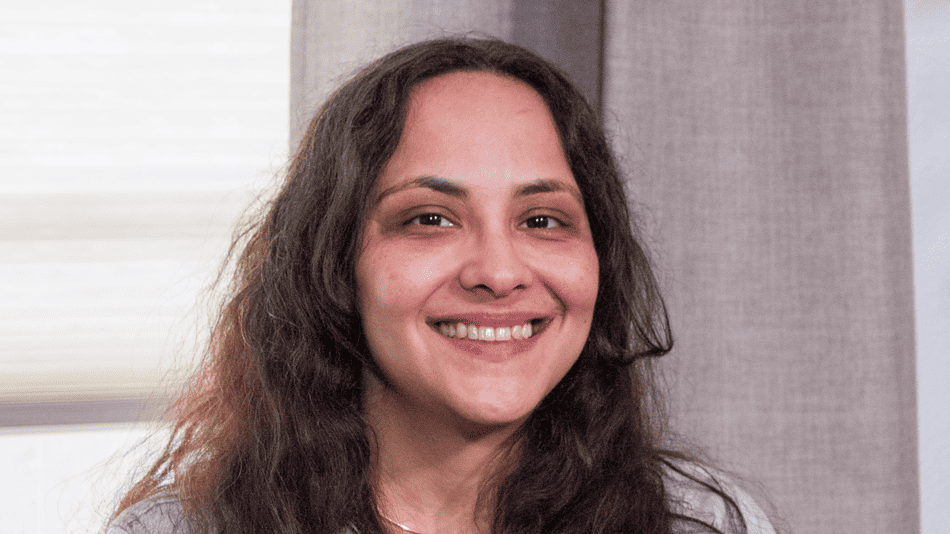
“What Was It Like? Stories by LGBTQ Elders” is a new program by I’m From Driftwood, in partnership with Comcast, the nation’s largest cable provider, and SAGE, the country’s largest and oldest organization dedicated to improving the lives of LGBTQ older adults. Learn more about the program here.
Thea Iberall’s 5 Video Stories and transcripts can be seen below.
TRANSCRIPTS
DOCTOR PUTS HANDS DOWN WOMAN’S PANTS TO DETERMINE HER SEX.
I was 19 years in 1968, and I discovered I was gay. And I was terrified. It was – I didn’t know anything about it, I didn’t know… there was no information. I mean I knew it was illegal. The DSM said it was – the psychiatrists, psychologists, everybody thought it was, you know, your mental – it was a mental illness.
I never felt crazy. I never felt mentally ill. It just was, you know, to be gay, to be attracted to another woman, it was just a sensation in my body.
I went to a psychologist in my college campus at the clinic there and I told him I was depressed and he kept pressing me to find out what I was, why I was depressed. It was hard to talk, but I finally came out to him and he says his answer was, “I knew it! I knew it! It’s all the rings on her fingers. I could tell.”
What is that? I was getting no help there. It was hard.
And then I got strep throat. Or I got a sore throat and it was another time I went to the clinic there. I went see the doctor and the doctor asked me to get up on the examining table. So I said “Okay.” And he proceeded to stick his hands down my pants. He eventually said he wanted a figure out of I was a man or a woman. I wore jeans, I wore tailored shirts, I wore loafers. I probably, I did not look like a frilly co-ed.
I didn’t know that I had any rights. I mean, there was no nurse in the room, I mean it was a time long before people made regulations or thought about patients’ rights. There were no patients rights and I didn’t know I had any rights.
And I’m glad that you have to have nurses in doctors offices now. I’m glad that there’s women doctors now for women. I’m glad of a lot of things that have changed. And I’m glad that it’s okay for women to wear pants.
ALMOST THROWN OUT OF COLLEGE FOR BEING A LESBIAN.
So in 1968 or 69, it was just, I had such fear after I realized I was gay. I was in college. I remember walking into the student center one day and I saw a sign saying the Mattachine Society was meeting there and I looked into the room and there was all these men there. I think older men. They didn’t look like students, they didn’t look like people I wanted to talk to. I knew it was for gay people and I didn’t – I was petrified to be around it because it was illegal and a mental illness and I didn’t want anything to do with that.
I went to a, I remember a sociology student wanted to interview me. She was a friend of a friend and she found out I was gay. And she decided that – we both decided that we couldn’t, she couldn’t interview me inside a building because somebody might overhear the conversation. So we met on the corner of the streets of New York on some random corner and she interviewed me. And I don’t remember the questions but it was strange to be talking about being gay to another person that I didn’t really know well. There’s just so much fear.
I remember I was with my lover in our dorm room. And suddenly, we heard this big knocking on the door and we were trying to get dressed and together to go answer the door, and before we can answer the door the RA just broke into the room and demanded to know what we were doing and what was happening. And we’re like denying everything. Nothing was exactly said but you knew, we knew that she wanted to get evidence that there was lesbianism going on in this room and that, because she had the power to throw us out of college. That’s the way I would have to come out to my parents. It was terrible. I had no power and everybody had all this other, this power to stop me from just being who I naturally was.
We were so alone at that time. And I look at the confidence that the kids have today. And they just don’t know that they have that because so many of us came out against our wishes, against…we had to overcome such fear in order to come out. And we did. And they walk the streets today, holding their heads up without any fear. I’m glad that they can do that.
MOTHER TRIES TO CHANGE DAUGHTER’S SEXUALITY, THEN BECOMES AN ACTIVIST.
So in 1973, I was really depressed again. You know, things are just happening in my life that my life was falling apart. And I started seeing a psychiatrist and one of the first things that the psychiatrist suggested was that my mother come to one of the sessions. And this was in New York, so my mother took the train in from Philadelphia and came to a session.
And in that session, he just kept talking to her and asking her questions and then she started mentioning her worries that I might be gay. And nobody said that I wasn’t and that’s how I came out to my mother. And, you know, she said… afterward she said, you know, I could have told her. I always could’ve told her. I just didn’t feel safe telling her, I didn’t know how to tell her.
So we went back to Philadelphia and like the first thing she did was she she dragged me to the mall to get my ears pierced. I think she figured that if I looked more feminine, then I would get over this idea of being gay. And it would be, you know, just a passing fad. But it wasn’t and we both struggled with it. It was, you know, I had to learn to come out to more people. I was finally glad that was out to my mom. My father accepted immediately but it was hard for my mom.
In 1987, I was really I was depressed again because my life was again falling apart. And this most amazing thing happened. My mother – they were living in a condo and they had a sauna. And she said, “Come into the sauna with me.” So I did and we sat there in the sauna, naked, with these little towels and we just talked. It was like the first time in our lives where we actually just talked. And I told her why my life is falling apart and I was so sad, and she shared stories of her life and we just bonded in such a way that we have never been able to bond before.
She became a real activist soon after that. She and my dad were at some rally – a politician was was speaking at UCLA and she, when a politician came out for around for gay rights, my parents, my mother was out there yelling and screaming and she was so happy about it. And I think it was around the time she tried to fix me up with a nice Jewish doctor, a woman.
She died last year at the age 102. I miss her a lot because she was such an incredible, vibrant person that she was. We both had to, we both evolved and learned about this. We didn’t expect it and we both learned from it and, and we embraced my being gay and celebrated it. And it was great.
WOMEN’S MUSIC “WAS THE GAYDAR BACK THEN.”
You know, I first came across women’s music in the late seventies. It was like ‘77, ‘78 I walked into this bookstore/record store in Northampton. And I said, “I’ve heard of women’s music. Where do I start?” And this woman she said, “I know where you start.” She just pulled out this album and handed it to me. And was “The Changer and the Changed” by Chris Williamson.
And it’s like, that was it! I mean, you just listen to this music and your life is changed. And it was the way to meet women, that if they knew women’s music then you know that they were lesbian.
I would try to work it into any conversations, like… and then they’d say, “Oh yeah, Chris Williamson was at our at our college or our school.”
“Okay!”
That was the gaydar then.
I think it was in ‘76 that music festivals, women’s music festival started. I think the first one was Michigan. I never went to that but I went to the first one that was in New England. And I went with my lover and we were, you know, we were so in the closet. It was terrible. And we were there amongst, you know, 500 lesbians, and we’re holding hands under a blanket so that nobody would know that, what? Of course we were lesbians! We were at a lesbian music festival! But we were so in the closet.
But I remember I was teaching at a graduate school at the time and I saw one of my students there. So I tapped her on the shoulder and I said hi. And she, like, turned around just like, “What are you doing here??” And I said, “The same thing you’re doing here!”
You know, it was all these isolated people just finding each other. And it was tremendous that I loved going to women’s music festivals.
When I moved to California in the ‘80s, I started going to the West Coast Women’s Festival up in Yosemite and it was incredible. You know, when I moved to California, it was because I had to come out. And I was coming out, I started going to gay pride parades, I marched in it. I went to the music, to the festivals, of pride festivals. And I went to the West Coast Music Festival and I walked around naked amongst all these other lesbians.
And they have workshops there of these consciousness-raising workshops. One of the workshops I went to at one of the music festivals was – the first thing that she asked everybody in the group was, “What word do you use for your vagina?”
You know everybody has culturally all these different words, so it’s like everyone’s coming out with all these different words, you know, to talk about, you know… It was so funny to hear it. But that was just one of the workshops. I mean, there were lots of workshops over, you know, even about finance and about, you know, other topics of interest.
You know, people don’t experience it anymore. It’s too bad. Because all of the women’s music has gone away. I mean, it’s become mainstream. And gay songs are everywhere, all mainstream. But there was something so magical about experiencing your love of women through music and these music festivals. It was wonderful. There was something so phenomenal to be celebrating yourself, celebrating your friends, celebrating being women, celebrating your love of women. It was an incredible sensation to do that through music.
40 YEARS AFTER DREAMING OF HER LESBIAN WEDDING, IT CAME TRUE.
Probably in 1969, I had this dream. And I dreamt that I was marrying a woman. And we had long white dresses on. And then I woke up. And I remember crying because I knew it was impossible.
Same-sex marriage became legal in California – I was living there – in 2008. I jumped at it. I just thought, “Yes!” I mean here it is! You know, from 1968, ‘69 till 2008. What is that, 40 years? I had to do it and then and then in California it was, these judges made it legal. And then Proposition 8 came along to, said, you know we have to make this illegal, we have to stop this. So I started working for Proposition 8 – against Proposition 8. I worked for the marriage equality. Just talking to people about that Proposition 8 shouldn’t pass.
So about 4 days before the election, my girlfriend and I got married on the beach in the fog, by a Wiccan priestess. With the 3 dogs, 3 little poodles as our witness. And so we were legally married. And it was wonderful. It was super.
And then four days later Proposition 8 passed and so it made same-sex marriage illegal in California again. And so we were one of the other 18,000 couples that that actually got married during that window of opportunity in California. And I was joyous but, you know, I wanted to have a full wedding. And right after that, it just couldn’t work out. It just, for years, it just couldn’t work out. We talked about it on and on about having an actual wedding and my mother got sick and, you know, it was just too much life going on.
So we eventually wound up back in Massachusetts together and as part of this Unitarian community that we love and we said, “Okay, we have a community.” And we had a little money and so we said, “Let’s have an actual wedding and we did. It was beautiful church wedding with the Jewish chuppah over us. We had a Jewish rabbi. We had a chaplain. We had friends and family surrounding us. And only one dog was still left and so the little dog was with us. And the grandchildren were with us. And it was beautiful, we had a beautiful wedding. And this incredible reception afterwards with lots and lots of dancing. Like a hundred people and speeches.
And at the reception, I gave a little speech. And I actually talked about, I said I had this dream 40 years ago, and this is what I always wanted. And so it was no small thing to have that wedding it just – it was – there’s a picture of me with a smile like I have never smiled in my life that much. It was an incredible smile and picture. So joyous. I’m really happy we did it.






Share